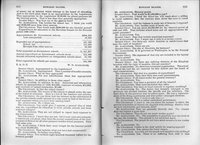632-633
| Previous Page | Next Page |

|
of money out at interest which belongs to the board of education. And in the third place there is an appropriation by the Legislature. They appropriate by the Legislature $190,000 for school purposes for the biennial period. That is less than they generally appropriate.
Senator Gray. Was that out of the general fund?
Mr. Alexander. Yes, besides the school tax. I think you could add $100,000 more from other sources.
The Chairman. That would make $290,000 for the biennial period? Expenditures for education in the Hawaiian Islands for the Biennial period 1890-1892:
|
Appropriations for Government schools |
$304,022 |
|
Less unexpended |
40,653 |
|
| |
|
Expended out of appropriations |
257,369 |
|
School tax |
151,906 |
|
Receipts from other sources |
38,662 |
|
| |
|
Total expended on Government schools |
2) 447,937 |
|
| |
|
Annual expenditure on Government schools about |
224,000 |
|
Annual estimated expenditure on Independent schools about |
60,000 |
|
| |
|
Total expended for schools per annum |
284,000 |
E. &. O. E.
W. D. Alexander.
Senator Gray. Appropriated by the Legislature?
Mr. Alexander. Appropriated. Then a number of smaller amounts.
Senator Gray. What do they aggregate?
Mr. Alexander. For new schoolbouses there was appropriated $52,500.
Senator Gray. In addition to those other sums?
Mr. Alexander. In addition to that: Industrial and reformatory school, by appropriation of 1890, $12,000; expenses of census, $12,000, and expenses of normal instruction, $2,000.
The Chairman. Is that the school census?
Mr. Alexander. The census of the islands is placed under the care of the board of education. Here is a list of the teachers and salaries.
The Chairman. Ho you think that the interest on the endowment of the private schools would amount to a sum equal to that of the Government expenses which you have been quoting here?
Mr. Alexander. No, I think not.
The Chairman. You could give, I suppose, a general idea of what was the expenditure for education in these private schools and these endowed colleges?
Mr. Alexander. They are not obliged to report their expenses to the Government.
The Chairman. I know they are not; but I want your own estimate. I want to ask you about what were the annual expenditures of the Government of Hawaii for all other purposes besides school purposes. Take that same year.
Mr. Alexander. I think their total budget for the biennial period was about $2,800,000.
The Chairman. That includes what you have just enumerated?
Mr. Alexander. Including everything.
Senator Gray. Two millions eiglit hundred thousand dollars for the biennial period?
|
Mr. Alexander. Biennial period.
Senator Gray. That would be $1,400,000 a year?
Mr. Alexander. I think the direct tax will reach about a million in round numbers; then the customs dues about the same in round numbers.
The Chairman. And the balance is made out of licenses, I suppose?
Mr. Alexander. Yes; besides rents of lands, etc.
Senator Gray. You say about $2,800,000 for the biennial period of 1890 and 1891. That includes school taxes and all appropriations for public purposes?
Mr. Alexander. Yes.
Senator Gray. Does that include municipal expenses?
Mr. Alexander. Yes; I might say it does to a certain extent.
Senator Gray. Are there any minor districts or subdivisions that have the right of taxation?
Mr. Alexander. There are not.
Senator Gray. The city of Honolulu, for instance?
Mr. Alexander. It is governed as Washington is, by the General Government.
Senator Gray. The expenses of that city are included in the figures you have given ?
Mr. Alexander. Yes.
Senator Gray. Are there any outlying districts of the Kingdom invested with the right of taxation, like our counties?
Mr. Alexander. No, there is no municipal organization. The school tax and the road tax are reserved for that district and the board of road commissioners.
The Chairman. But that is a question of expenditure?
Mr. Alexander. They elect their own road commissioners.
Senator Gray. It all comes under the general treasury?
Mr. Alexander. Yes.
The Chairman. You have a governor of all the islands?
Mr. Alexander. They have abolished that office.
The Chairman. You have no local councils to regulate anything?
Mr. Alexander. No. The duties that formerly belonged to the governor are divided between the sheriffs and tax collectors. The main duty of the governor was to collect taxes. He was a representative of the King, a politician and wire-puller—managed elections.
The Chairman. Now, I want to ask you----
Mr. Alexander. It is a rather centralized government.
The Chairman. I want to ask you about the manner in which the general population of Hawaii are supplied with clothing; whether they are now comfortably and decently clad?
Mr. Alexander. They are generally decently clad. The climate does not require a great deal.
The Chairman. They do not use much woolen goods?
Mr. Alexander. No. The population is generally near the level of the sea, the lowlands. The upland is not inhabited much.
The Chairman. The people do not have much occasion to use woolen goods?
Mr. Alexander. No.
The Chairman. Cotton is the chief article for wearing apparel?
Mr. Alexander. Yes, among the lower classes.
The Chairman. As a rule are the people well supplied with clothing?
Mr. Alexander. Yes. There is no suffering from cold in that country.
| Previous Page | Next Page |